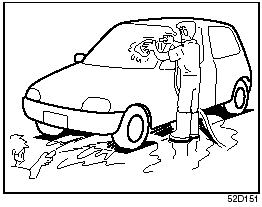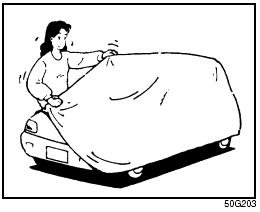Corrosion Prevention
It is important to take good care of your vehicle to protect it from corrosion.
Listed below are instructions for how to maintain your vehicle to prevent corrosion.
Please read and follow these instructions carefully.
Important Information About Corrosion
Common causes of corrosion
1) Accumulation of road salt, dirt, moisture or chemicals in hard to reach areas of the vehicle underbody or frame.
2) Chipping, scratches and any damage to treated or painted metal surfaces resulting from minor accidents or impact from stones and gravel.
Environmental conditions which accelerate corrosion
1) Road salt, dust control chemicals, sea air or industrial pollution will all accelerate the corrosion of metal.
2) High humidity will increase the rate of corrosion particularly when the temperature range is just above the freezing point.
3) Moisture in certain areas of a vehicle for an extended period of time may promote corrosion even though other body sections may be completely dry.
4) High temperatures will cause an accelerated rate of corrosion to parts of the vehicle which are not well ventilated to permit quick drying.

This information illustrates the necessity of keeping your vehicle (particularly the underbody) as clean and dry as possible. It is equally important to repair any damage to the paint or protective coatings as soon as possible.
How to Help Prevent Corrosion
Wash your vehicle frequently
The best way to preserve the finish on your vehicle and to help avoid corrosion is to keep it clean with frequent washing.
Wash your vehicle at least once during the winter and once immediately after the winter.
Keep your vehicle, particularly the underside, as clean and dry as possible.
If you frequently drive on salted roads, your vehicle should be washed at least once a month during the winter. If you live near the ocean, your vehicle should be washed at least once a month throughout the year.
For washing instructions, refer to the “Vehicle Cleaning” section.
Remove foreign material deposits
Foreign material such as salts, chemicals, road oil or tar, tree sap, bird droppings and industrial fall-out may damage the finish of your vehicle if it is left on painted surfaces.
Remove these types of deposits as quickly as possible. If these deposits are difficult to wash off, an additional cleaner may be required. Be sure that any cleaner you use is not harmful to painted surfaces and is specifically intended for your purposes.
Follow the manufacturer’s directions when using these special cleaners.
Repair finish damage
Carefully examine your vehicle for damage to the painted surfaces, especially if it is used off-road. Should you find any chips or scratches in the paint, touch them up immediately to prevent corrosion from starting. If the chips or scratches have gone through to the bare metal, have a qualified body shop make the repair.
Keep passenger and cargo compartments clean
Moisture, dirt or mud can accumulate under the floor mats and may cause corrosion.
Occasionally, check under these mats to ensure that this area is clean and dry. More frequent checks are necessary if the vehicle is used off road or in wet weather.
Certain cargo such as chemicals, fertilizers, cleaners, salts, etc. are extremely corrosive by nature. These products should be transported in sealed containers. If a spill or leak does occur, clean and dry the area immediately.
Use the body trim
The use of the body trim will help protect your vehicle, especially if you frequently drive on gravel or salted roads. The fittings for such guards should also be corrosion resistant. Please check with your authorized SUZUKI dealer for information on these guards.
Store your vehicle in a dry, well-ventilated area
Do not park your vehicle in a damp, poorly ventilated area. If you often wash your vehicle in the garage or if you frequently drive it in when wet, your garage may be damp. The high humidity in the garage may cause or accelerate corrosion. A wet vehicle may corrode even in a heated garage if the ventilation is poor.

WARNING:
Do not apply additional undercoating
or rust preventive coating on or
around exhaust system components
such as the catalytic converter,
exhaust pipes, etc. A fire could be
started if the undercoating substance
becomes overheated.

Cover your vehicle
If you can not regularly park your vehicle in a garage, we recommend you use a vehicle cover. Years of exposure to midday sun can cause the colors in paint, plastic parts and fabrics to fade. Covering your vehicle with a high-quality, “breathable” vehicle cover can help protect the finish from the harmful UV rays in sunlight, and can reduce the amount of dust and air pollution reaching the surface. Your SUZUKI dealer can help you select the right cover for your vehicle.
See also:
Sun Visor
Sun Visor
The sun visors can be pulled down to block
glare coming through the windshield, or
they can be unhooked and turned to the
side to block glare coming through the side
window.
CAUTION: ...
Location of Warning Messages
Read and follow all of the warnings (labels
etc.) on your vehicle. Make sure you
understand all of them. Keep them on the
vehicle. Do not remove the messages for
any reason. If a label comes off o ...
Warranties
The warranties covering your vehicle are
explained in a separate New Vehicle Warranty
Information booklet given to you at
the time of sale. Please read this booklet
carefully so you can understand ...
